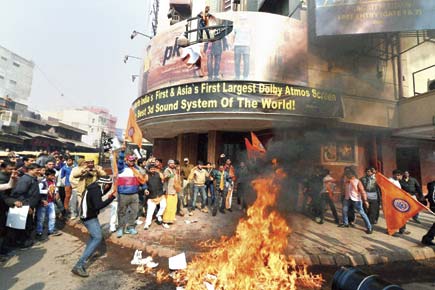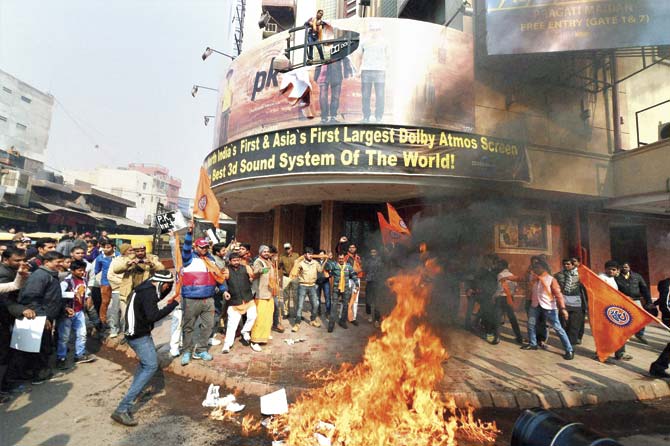It is all mixed up. The Hindu right-wing wanted PK banned because they reckon it hurts Hindu sentiments

 It is all mixed up. The Hindu right-wing wanted PK banned because they reckon it hurts Hindu sentiments. The Central Board of Film Certification (CBFC) did not think that the film, which mocks god-men does that. It however refused to give Messenger of God, a film that glorifies a god-man a censor certificate. The government believed otherwise and the film finally got a certificate. The ensuing controversy saw 12 CBFC members and its chairperson resigning. In the interim armed gunmen walked in killed the staffers of a satirical French magazine, Charlie Hebdo, in Paris. Their religious sentiments had been hurt.
It is all mixed up. The Hindu right-wing wanted PK banned because they reckon it hurts Hindu sentiments. The Central Board of Film Certification (CBFC) did not think that the film, which mocks god-men does that. It however refused to give Messenger of God, a film that glorifies a god-man a censor certificate. The government believed otherwise and the film finally got a certificate. The ensuing controversy saw 12 CBFC members and its chairperson resigning. In the interim armed gunmen walked in killed the staffers of a satirical French magazine, Charlie Hebdo, in Paris. Their religious sentiments had been hurt.

Right wing activists burn posters of PK outside a New Delhi movie theatre. Can freedom of expression be anything but absolute? If not then who decides its limits? File pic
ADVERTISEMENT
PK, Messenger of God, Charlie Hebdo and the CBFC all form different sides of the same issue freedom of expression, especially that of creative expression. A country and its people are damned if they have it — like the Danes, Dutch or French. And damned if they don’t have it, like the Afghans, Iranians, Pakistanis and, worst of all, North Koreans.
But what of the countries that flirt with it, contend they have it but keep putting limits on it in the name of decent behaviour or public morality or hurting X or Y’s sentiments. India, Turkey, USA, UK among others. The only thing that varies is the kind of limits, the degrees of suppression. Sony Pictures, a Japanese/American company decided to hold back the release of The Interview which shows the assassination of the North Korean dictator Kim Jong-Un after its systems were hacked and scripts leaked, reportedly by North Koreans.
In the UK, the Leveson enquiry triggered by the transgressions of one paper led to a Royal Charter that now governs the working of newspapers. The way this charter is structured leaves the industry open to meddling by a government that decides on it.
In Turkey, which had a reasonably free media so far, the fear of being embroiled in corruption cases is making the government paranoid. It is clamping down on press freedoms, searching homes of reporters, even in response to tweets from them.
India is supposed to be liberal, but one whiff of trouble and films are withdrawn and books are banned. From Wendy Doniger’s book on Hinduism to Rohinton Mistry’s work, India is a happy melting point for the millions of people dying to take offence at something or the other. Barbers thought the term ‘barber’ was derogatory so Billu Barber became Billu (2009). Dhobi Ghat (2011) had dhobis or washermen in Mumbai up in arms. Deepa Mehta’s Fire (1996) was pulled out of theatres because conservatives objected to its lesbian protagonists. Mehta later couldn’t shoot Water (2005), a film on widows, in Varanasi. There is an endless list of films, books, paintings or creative works that have never seen the light of day, been burnt or banished from the country. And many of them are not even particularly good. Nevertheless they manage to offend somebody or the other.
The question much of this banning and burning raises is not whether freedom of expression is necessary. Most Indians agree it is. The question it raises is — is absolute freedom of expression a practical thing to have? It is an oxymoronic question. If you attach conditions to the ‘freedom of expression’ it is no longer ‘free.’ Most developed countries that have lived with a free economy and society for years haven’t managed to figure this one out. So for countries like India, which have not lived with complete freedom for many decades, with its immature, chatty, chaotic democracy, the whole idea of complete freedom of expression is a difficult one to swallow.
In French society or in Denmark, it is perfectly alright to laugh, poke fun at or caricature gods, politicians, celebrities or religious figures. Nothing is taboo. But when people from other cultures do not get the honest egalitarianism of this freedom a Charlie Hebdo happens.
That brings us back to the question can humanity understand and live with absolute freedom of expression?
The writer is a media specialist and author. Follow her on twitter at https://twitter.com/vanitakohlik
 Subscribe today by clicking the link and stay updated with the latest news!" Click here!
Subscribe today by clicking the link and stay updated with the latest news!" Click here!







